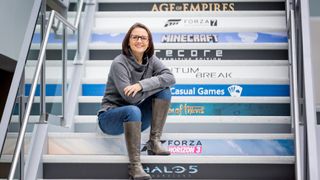Xbox on bringing its inclusivity resource hub to the public: "We can share learnings both ways"
Interview | In conversation with Katy Jo Wright on Xbox's Product Inclusion Framework

Over the years, Xbox has championed its philosophy that gaming is for everyone. It's become a huge part of the publisher and platform's branding and approach, but it would ultimately be meaningless if nothing was done to actually put this philosophy into action. It's why it was important that we saw Xbox launch the Gaming For Everyone initiative in 2015, which strives to help make gaming more inclusive across the globe to this day. As a guiding principle, it's already helped to influence the creation of various programs and products: from the likes of the Developer Acceleration Program, which provides support for underrepresented creators who aim to bring their games to the platform, to the community-driven Xbox Ambassadors, and the accessible Xbox Adaptive Controller.
As part of its ongoing efforts to make games more inclusive, Team Xbox also created an internal hub known as the "Gaming for Everyone Product Inclusion Framework" that it has been using since 2019. The hub compiles resources, support, and information to help developers take actionable steps to make their games more inclusive for players. While strides have been made at Xbox, the goal to make gaming truly for everyone transcends a single platform or company, it's something that should be happening industry wide, which is why it matters that an announcement at GDC confirmed this framework is now publicly available for the first time.
"This is going to be a resource hub, and we're going to continually be putting up new resources," head of Gaming for Everyone and sustainability Katy Jo Wright tells me. "As we learn more, we're going to be putting up more, which we are constantly doing on our internal hub. So we're now going to have an external hub and we're also working through as well - is it a Discord channel? Is it an alias or another group? - but what are ways that we can have the ongoing discussions as well, so that we can be sharing learnings both ways. It's not just us sharing learnings and we are fully anticipating - and that's part of the exciting part too - is that we can be learning from external developers and the broader community. And we've seen that it's not just for AAA games, or midsized studios, we work with ID@Xbox and indie studios, and we've seen these resources help studios and developers of all sizes."
Bigger picture

The salient point here is "sharing learnings both ways". The more the wider industry collaborates, is willing to have open conversations, and share resources and learnings, the more we will ultimately benefit as players. As Wright explains, the framework isn't intended to be a definitive checklist to tell developers what they should be doing, but rather a collection of resources that can offer support and show teams examples of actionable steps that can be taken to make their games more inclusive.
The hub encompasses four key areas: accessibility, representation, approachability, and globalization. Xbox calls these "doorways", which is a metaphor for gaming "as a doorway into another world", as Wright puts it. It also applies to the nature of the framework, which covers these four areas in the hope that it will help developers intentionally open more doors for players who may come up against barriers.
"One of our core principles is if you don't intentionally include, you will unintentionally exclude. And there's no judgment in that statement", Wright says. "And so this [the framework] is really about being deliberate and bringing that level of intentionality, but it is by no means a checklist, or telling you what to do, because every game experience is different."


In order to actually make gaming truly for everyone, it feels important that we see major publishers and names in games – not least Xbox – be open and willing to work with others and listen and learn from the wider community. As it turns out, this is partly why Team Xbox wanted to share the framework. After using it internally, Wright and the team recognized a need to see if the resources work as intended, and also saw it as an opportunity to "learn together" with more developers by making the framework publicly available.
Sign up to the GamesRadar+ Newsletter
Weekly digests, tales from the communities you love, and more
"We created it internally, and we've been using it. And so frankly, we wanted to see: is it working? Like does it really help developers in the way we were intending? Because there's always a difference between what your intention is, and then what the impact is," Wright says. "And so we wanted to be really sure that we are seeing progress. We are seeing a lot of change internally within gaming, the dialogue has changed about how we're talking about different aspects of the gaming experience, so we want to share that. But it by no means is saying we have it all figured out. And you know, here's the checklist of things to go do. But it's just, how do we all learn together and be on this journey together? Because we're constantly learning, and as humans, we're going to be constantly evolving, right? There's no such thing as done, or pure expertise in this, because as humans, we all have such different experiences. But how do we learn together?"
"Learning loop"

It's evident from speaking to Wright that the Gaming for Everyone strategy Xbox adopted in 2015 has been nothing if not a constant "learning loop", and it's thanks to feedback that the framework has continued to evolve since its inception: "There would be no framework, there would be none of this without ongoing feedback and dialogue," Wright says. "We've created different channels, whether they are internal channels to continually have a dialogue with members of different communities, but also with players and getting feedback from players. So we leverage our Xbox Ambassadors quite a bit, and we have ongoing dialogue from a player perspective. And there are some that are NDA'd, our Community Champions, to where we can share something with them in advance and get their reactions, like is this landing? So again, it's kind of matching that from our intentions. Is it having the impact we are intending? And if not, where are we missing the mark? How do we adjust?"
Since the creation of the intital framework in 2019, Wright says everyday has been a series of "learning and new aha moments". I take the opportunity to ask what some of the biggest lessons have been since the hub came together and continues to evolve, with Wright saying that it's all been about building up the comfort and trust that the team can go out and try new things and be willing to "accept that we're going to make mistakes".
"And it's not the mistake, it's what you do afterwards, to acknowledge the mistake, apologize in the most sincere way, and then be committed to learning how that mistake happened," Wright says. "So that we can change processes, mindset, skill sets, whatever we need to do, to make sure we don't make that same mistake again. And so I think that's the learning of being more comfortable with that."

"So many of our team members that work with third party partners, they've been asking us to get this out for years, because they're constantly referencing it."
Katy Jo Wright
With feedback constantly helping to shape the framework and many programs at Xbox, Wright points to some tangible examples of how these resources have helped games be more inclusive already. From highlighting Playground Games' portrayal of Mexico in Forza Horizon 5 from a globalization perspective, to how the robot Jack lets you play Gears 5 in a support role in co-op as an example of approachability, Wright also mentions the Xbox Accessibility Insider League, which lets players give feedback on the accessibility of games to help developers improve. Now that it's made available at an external level, there's the hope that the resources will help more developers and games in studios of all sizes.
"So many of our team members that work with third party partners, they've been asking us to get this out for years, because they're constantly referencing it. But they haven't been able to share the resources. And so they've been asking for this. I'm just excited for whoever it's valuable for. So this isn't something we're necessarily pushing and saying everyone must do this, because it's not a checklist. But it is going to be there for people who want to make their games more inclusive, for people who want to expand their reach and deepen player engagement. These resources and tools are there for you to be helpful in whatever way they can serve you. So that's what I'm excited about and you know, it's really kind of coming down to, we believe that gaming is for everyone. So how can we help empower that to become the reality across the board?"
While there's always more work to be done when it comes to making gaming for everyone, this feels like another step in the right direction. It'll be interesting to see just how and if this may help more developers across the industry - not just within Xbox - as the team continues to add and develop the hub in the future. Ultimately, the hope is, as Wright says, "that more people feel like gaming truly is for everyone."
See what releases await us with our roundup of upcoming Xbox Series X games.

I started out writing for the games section of a student-run website as an undergrad, and continued to write about games in my free time during retail and temp jobs for a number of years. Eventually, I earned an MA in magazine journalism at Cardiff University, and soon after got my first official role in the industry as a content editor for Stuff magazine. After writing about all things tech and games-related, I then did a brief stint as a freelancer before I landed my role as a staff writer here at GamesRadar+. Now I get to write features, previews, and reviews, and when I'm not doing that, you can usually find me lost in any one of the Dragon Age or Mass Effect games, tucking into another delightful indie, or drinking far too much tea for my own good.

Destiny 2 is un-sunsetting every gun in the MMO with The Final Shape's massive Power changes – but Bungie says "we have no recovery mechanism" for deleted ones

After selling 1 million copies, Balatro creator admits it's "held together with hopes and dreams" as game devs rally around the roguelike's beautifully nightmarish code
Most Popular



